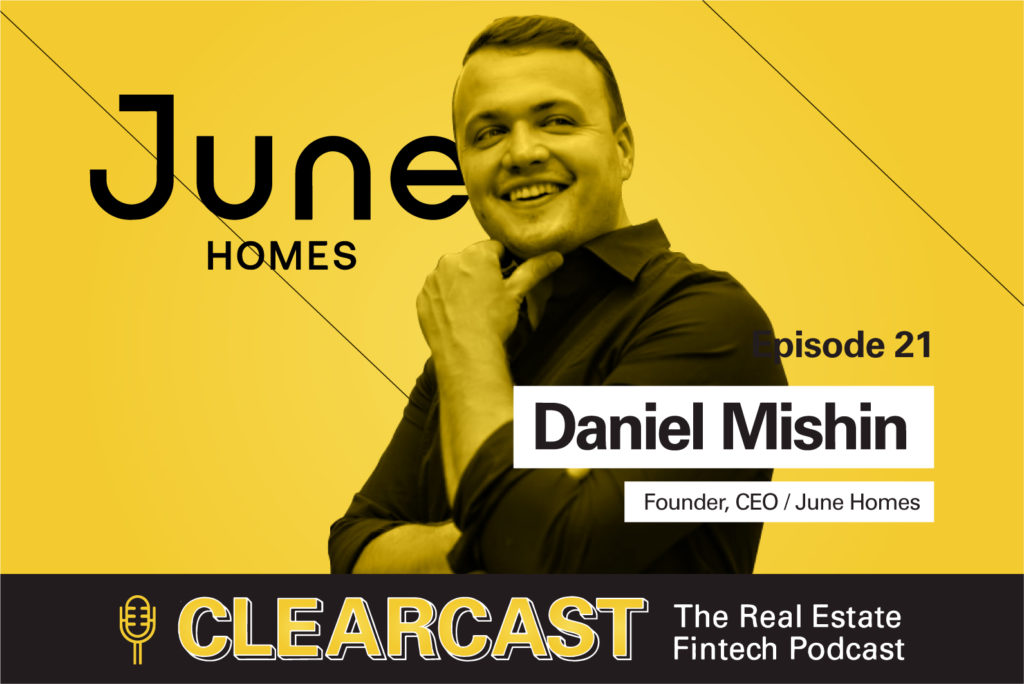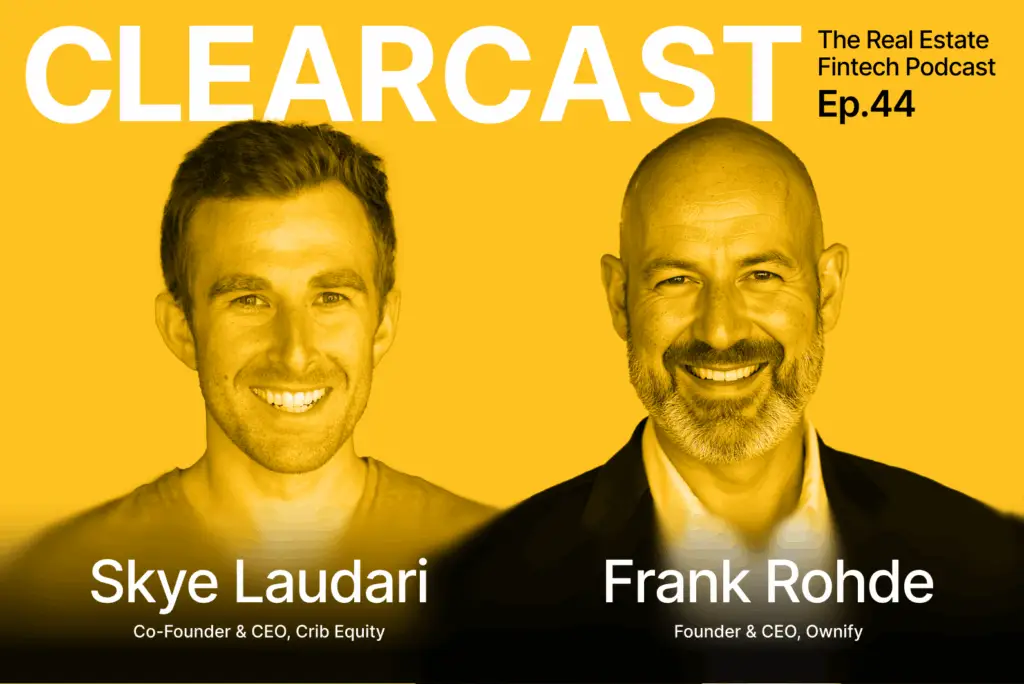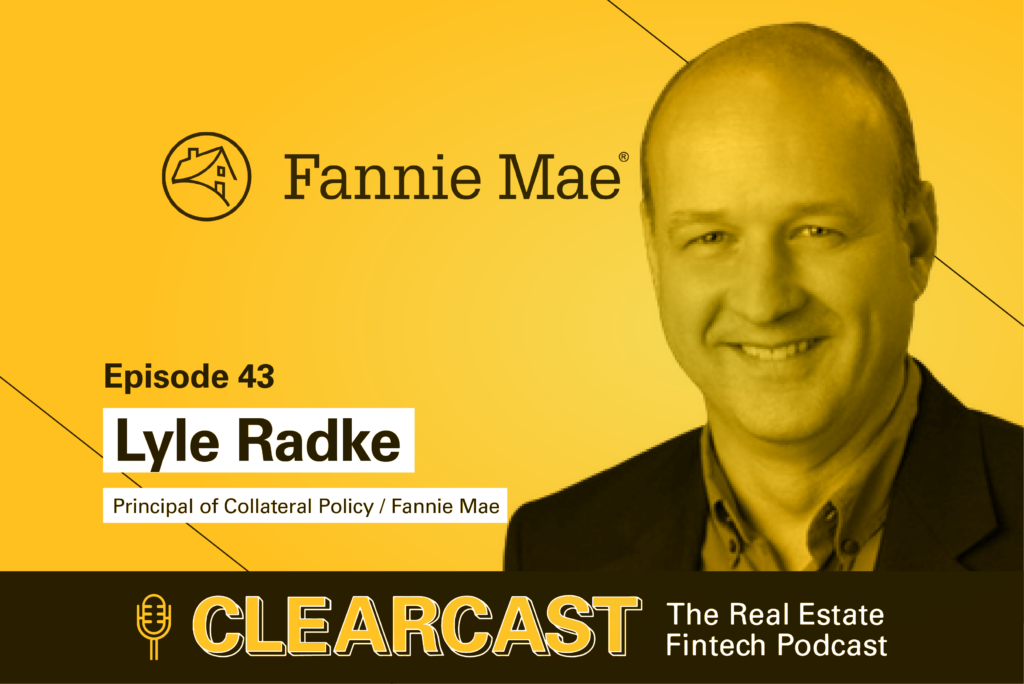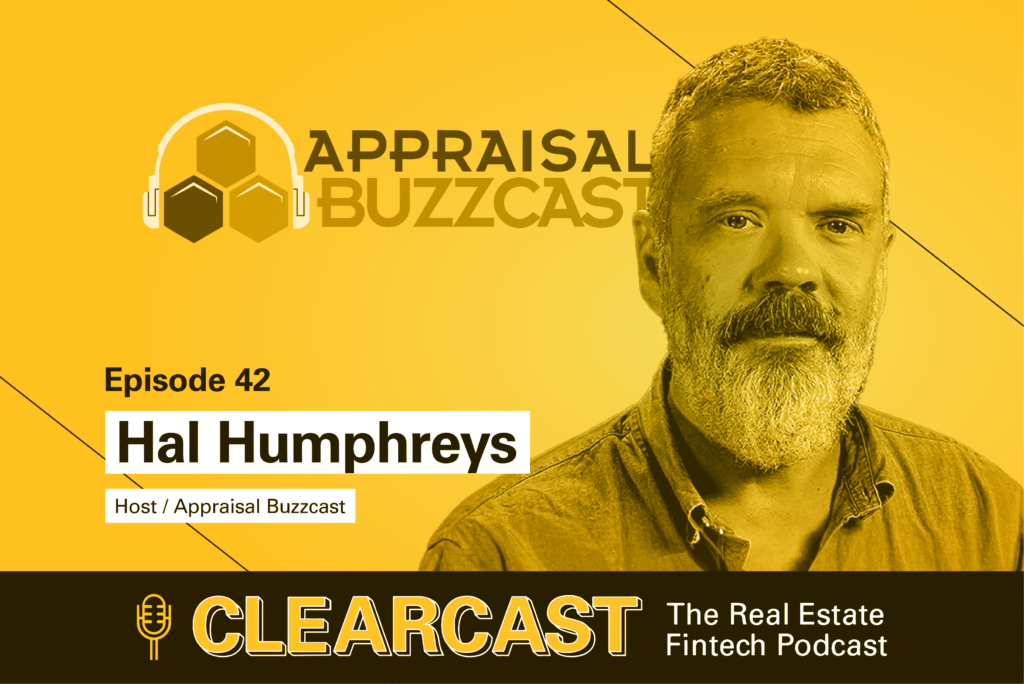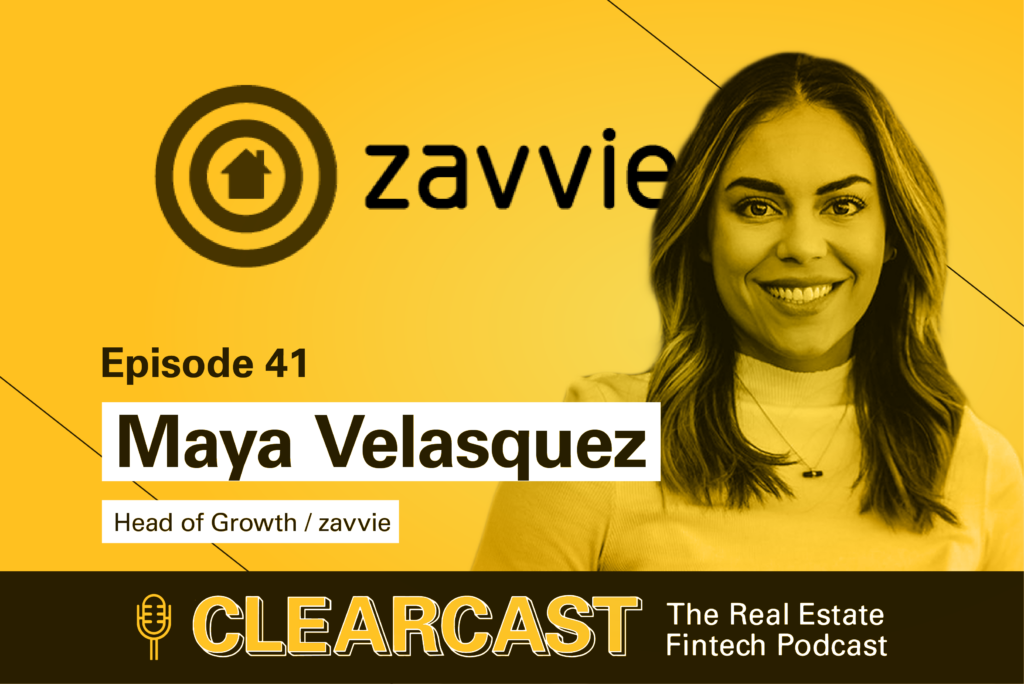🎙️ Follow ClearCast on LinkedIn, Twitter, Facebook, and Instagram. 🎙️
EPISODE SUMMARY
Jeff and Kenon discuss this record-breaking year for prop-tech investments. Jeff’s real estate joke of the pod makes Kenon flip out. Interview with June Homes Founder and CEO Daniel Mishin.
Watch ClearCast E21 👇
Listen to ClearCast E21 👇
Read the ClearCast E21 transcript 👇
Jeff Allen
Hello and welcome back to ClearCast, the Real Estate Fintech Podcast. This is a very exciting episode because it’s episode 21! Thank you for holding up your fingers like that. That means that this podcast is officially old enough to drink a beer.
Kenon Chen
Oh, congratulations!
Jeff Allen
Congratulations. I’m Jeff Allen, joined as always by my friend and colleague, Kenon Chen. How are you, Kenon?
Kenon Chen
I’m doing good. Thank you. How are you?
Jeff Allen
I’m also great. Thank you for asking. We have a really fun episode. We’re being joined later today by Daniel Mishin, who’s the founder and CEO of June Homes, and talk about some very interesting things that they’re doing to disrupt the rental space. But before we do that, let’s talk a little bit about the news, Kenon.
Kenon Chen
Oh, well, I think there’s lots of things happening in the news. But one thing that jumped out at us because of course, we talk about real estate, fintech, which includes the wonderful world of proptech. And, apparently 2021 is a record in investment in proptech — $9.5 billion has been invested in terms of funding in 2021, which exceeds the previous record in 2019 of $9 billion when extra $0.5 billion. And this comes courtesy of Next Mortgage News, thank you. And it highlights some of the companies that have really closed pretty big rounds of funding this year, but it seems to be really accelerating. And, one of those companies is backed by no other than Amazon backing a startup called Smart Rent. Did you see that, Jeff?
Jeff Allen
I did. And if you think about what Smart Rent does, it makes a lot of sense. Smart Rent is a smart home automation solution provider, but it’s specifically focused on apartment rental as one of its main verticals, and giving folks who operate and manage you know, big portfolios of property — specifically rental property, gives them some pretty interesting tech solutions to manage things like showings giving people the ability to unlock their apartments with their mobile app instead of an old fashioned key. So kind of a whole tech stack around it, which is actually pretty fitting because we’ve got you know, Daniel from June Homes joining us later to talk about some of their solutions in this space. And Smart Rent, yeah, Amazon backed makes a lot of sense. If you think about it, Amazon’s got that whole Alexa thing. Do you have an Alexa, Kenon?
Kenon Chen
No, we had a falling out actually.
Jeff Allen
I’m so sad to hear you say that because I had one Alexa but now I have like seven Alexas.
Kenon Chen
Oh, wow. Well, I don’t know. She heard me talking to Siri and it got ugly from there.
Jeff Allen
Understood. So yeah, Amazon had made big investments in Smart Rent and then this year Smart Rent, you know, kind of went to the next level and did a SPAC — merged with a SPAC. I feel like we’re hearing this term every other day now, SPAC. So yeah, they were highlighted in the article. Definitely a group that we’re going to be keeping a close eye on.
Kenon Chen
You just like saying it, I think.
Jeff Allen
SPAC. SPAC. SPAC. Another company that’s moving and shaking with some new investments is a company you know pretty well, Kenon, called simple Nexus, they just announced a pretty big deal.
Kenon Chen
Yeah, they just sold for $1.2 billion in November, which is half of the valuation, of course of Smart Rent, which we’re just talking about. But still a chunk of change. And they describe themself as a developer of the mobile-first home ownership platform. They are not a point of sale, they will tell you that they’re not a point of sale. They are a digital lending platform. But that’s mobile first. The digital mortgage movement is alive and well. And I think you know, when you put these all these things together, the idea of a more streamlined process on the purchase side, on single family rental, on all the things up front and then the investment in platforms it really streamline the finance side of things. I mean, we’re set for pretty transformational 2022, I think.
Jeff Allen
Yeah, with the level of investment that has been going on the last couple years — because don’t forget, 2021 was a record year for proptech investment. But that was on the heels of 2019 being the previous record, and 2020 only came down a little bit and that was largely driven by a temporary pause due the pandemic, probably, so we’re in a multi-year trend of more and more investment coming into proptech, real estate and fintech eventually, well, we can already start to see it, but eventually it’s really going to start to turn into real industry innovation.
Kenon Chen
And now we’re gonna take the next hour and dogpile on Zillow for pulling out of i-buying.
Jeff Allen
Let’s not do that.
Kenon Chen
Ok, we’re not ghoing to do that.
Jeff Allen
There has been way too much dogpiling on Zillow. They went after a problem that was very hard to solve. They went after it hard. They admitted their mistakes, they regrouped. There’s been a little too much satisfaction from the chattering classes about their departure from i-buying, don’t you think?
Kenon Chen
Yeah. I think the term is called Monday morning quarterbacking. Is that the correct sports analogy, Jeff?
Jeff Allen
I’m impressed that you got that right.
Kenon Chen
Thank you. And what that stands for is that quarterbacks on Monday morning sometimes play on Monday to get a head start on Monday Night Football. That right?
Jeff Allen
Absolutely incorrect, but I loved hearing you try to get it right.
Kenon Chen
Ah, well.
Jeff Allen
From some serious topics to an even more serious topic. Are you ready for the joke of the pod?
Kenon Chen
Oh, it’s gonna get serious? Yes. Yes, I am. No, I’m not ready. But I’m gonna I’m going to try and quarterback it.
Jeff Allen
Monday morning it. Out of respect for you, this is a little bit shorter of a joke this time. There’s less lead-in.
Kenon Chen
Christmas has come early.
Jeff Allen
So there’s this real estate agent, right? And everyone is super scared of him. Like, they think that he might physically harm them. Like, when people see him in dark alleys, he doesn’t even have to do anything. They literally pee in their pants when they see him and they run away as fast as possible. Super weird, right?
Kenon Chen
Very weird. Yes.
Jeff Allen
Like, why are they so worried about like physical violence from this one realtor? Well, first, he’s actually super buff. Like he has massive muscles. Like he’s incredibly ripped and jacked, I believe is the phrase that people would use to describe this guy. He probably benches.
Kenon Chen
And that makes him scary?
Jeff Allen
Yeah, I well. I mean, if you saw a guy like that, you’d be a little freaked out, right? He can probably benchpress like 6,000 pounds. A lot. Second, he’s got kind of a unique business model, actually. He doesn’t represent buyers and sellers, like a traditional agent. He’s actually somebody who just buys houses that are a little run down, need a little work, maybe a little outdated, and then he fixes them up and resells them for more money than he bought them for. So why would that make everybody so scared of him bringing physical violence on them?
Kenon Chen
I don’t usually see that thing happen on HGTV so…
Jeff Allen
Well, it’s obvious. Wouldn’t you be scared of a guy who couldn’t literally flip a house?
Kenon Chen
…
Jeff Allen
Do you get it? It’s kind of lame. The other ones have all been really good. That one was a little lame.
Kenon Chen
Wow. Well, why do you have to be scared of him though?
Jeff Allen
Because he can flip a house. It takes a lot of strength to do that, and he’s jacked.
Kenon Chen
But it, that could be cool, right? Like everyone wants to be around him because he can flip a house.
Jeff Allen
Yeah, I mean, I’m not excusing the behavior of these people. I’m just explaining like, what’s literally happening.
Kenon Chen
It just seems very, you know, it just seems very stereotypical, you know, just because someone is jacked. I mean, I feel because of the size of my muscles that I’m being discriminated against.
Jeff Allen
I think that’s fair.
Kenon Chen
Because of how jacked I am.
Jeff Allen
I am a little frightened by you, actually. Most of the time. I’m not excusing their behavior, like I said. I’m just explaining, you know, kind of what I’ve been hearing about this situation.
Kenon Chen
Now this is a news report.
Jeff Allen
Okay, we are very happy now to be joined by Daniel Mishin. And Daniel is the founder and CEO of a company called June Homes. And they’re a proptech startup that’s challenging outdated practices to improve the rental experience for tenants and landlords alike. Daniel, thanks for joining!
Daniel Mishin
Jeff, Kenon, great to be here.
Kenon Chen
Hey, Dan, it’s great to have you on. First of all, I just wanted to get your take on a piece that I saw on your website, which is you talked about the new generation of renters. And I wanted to see, obviously, you’re thinking about that as we get more into what June Homes does, but how do you describe who the new generation of renters are? And what they care about? How are expectations changing from what used to be expected for rentals and where things are headed?
Daniel Mishin
Yeah, good question. I mean, I think renters is basically — I want to say that there’s no like one answer to that question. Because you essentially have so many different subgroups of different people who live completely different lifestyles. And someone who is a digital nomad who travels around the world and basically spends every night in different place is also a renter. But if we speak about majority of people, I think things that are actually changing, and that actually becoming unique, are the things that people are starting to split their time between multiple different locations. And are starting to travel more than they have in the past. So what we are seeing, and what we think is happening is essentially, your traditional long term, 12-months rental category is becoming shorter, because renters are coming back to their landlords, and they’re saying, “hey, can I do a month-to-month lease, can I do a nine-month lease?” They’re looking for that flexibility, because A, they’re not really certain where they’re going to be a year from now. And B, they basically want to split time between different cities. Someone might want to spend nine months a year in New York, and then three months a year with their parents in Ohio. And that kind of use case was really not a mainstream use case before. But it is becoming a mainstream use case today. So long term, this is sort of coming true. That’s just part one. It’s kind of like it’s mainstream media at this point that covers this, it’s kind of like becoming becoming a new major trend. It’s been a trend before COVID. It just was accelerated with COVID. But then what’s also interesting is that short term stays are becoming longer. Because if you think about it, there are two interesting trends that are happening there. Short term regulations is changing in all major US markets, cities that are initially permitted short term, or short term states, like Boston, DC, and other cities are changing their regulations back to restricting short term stays to 30 days minimum in residential real estate. And two — that’s like trend one — and two, when people work and travel at the same time — they call it workcation or whatever the defin8itive word is — they tend to travel for longer because they need work setups. They don’t want to basically travel during the weekdays, they want to travel on the weekends, so that they don’t have to take time off work and have those like those trends pushing minimum stay duration for short term stays longer. So long term leases becoming shorter and shorter term is becoming longer. And we think that pretty much as we speak, a new category is being created. It’s a category of on-demand flexible housing. That’s sort of how we think about it.
Jeff Allen
I love that term, “on-demand flexible housing.” If an uninitiated person was to go to your website, you know, June Homes, and and start looking around, they’d see a lot of stuff that normally one might associate with maybe a typical apartment listing site, right, there’s lots of apartments available. You can search you can look at maps, and so if somebody like didn’t know any better, you know, they might think oh, this is an apartment listing portal, but really what June Homes does is way more than that. You guys are touching the whole process. and seem to be attacking everything, including stuff like, you know, payments processing after the fact. So can you walk us through kind of all the different parts of the rental process you guys are working through?
Daniel Mishin
Sure. Um, so we are bucketed into this bucket called managed marketplace bucket, which essentially means that it’s a marketplace, but it’s a more vertical version of the marketplace, a more like, sort of like extended experience version of the marketplace. And what that actually means is that we have two sides of our marketplace, we have landlords, and then we have tenants. We call landlords investors are called tenants residents, so and essentially our residents, the benefit to our residents is that we’re essentially giving them access to this branded real estate where they can rent apartment structure homes, acting as their landlord, and all of our leases are flexible, any duration between one to 12 months, they can essentially choose how long they want to stay, and the longer they stay, the cheaper it gets. So there is a complete flexibility on the duration side. But they’re fully customizable, right on the website, they can choose how they want their units delivered to them — furnished, unfurnished or partially furnished — and essentially customize their rental. And they could say hey, I want this couch this, this light fixture, this bed. And on the day of their movement, we’re essentially going to deliver the unit in the way they want it. And then three, it’s a much more streamlined experience. Apartment renting is crazy. It’s very outdated. It’s very long, it takes forever. It’s very structured, it’s very manual. So what we’ve done is we’ve essentially built a lot of technology to streamline the entire process. The typical rental application in a city like New York or San Francisco could take up to three weeks. In June Homes, it takes three hours. You go online, download an app, and in the app, you find apartments, you tour apartments in the app right there online, you have transparent marketing materials. Every apartment has floor plans, videos, 3D tours, descriptions, photos, and we collect 250 plus data points about each department. So we literally display way more information than anyone else on the web about each unit. And then once you found the apartment that you like, you can sign up, you can do a virtual tour online within 15 minutes, no scheduling, no back and forth, no emails, no text, essentially right there online. And you can apply within a matter of minutes. And you’re going to get a reply within three hours, you can sign the lease same-day and move in same-day. And then once you stay with us, we have a 24/7 in-app concierge that communicates with you about any of the issues. So it’s this like Gen Z and millennial experience, very streamlined, very simple. No commitments, or no upfront costs, no broker fees, no furniture, no furniture costs, none of that. And that essentially was our product before COVID and that was accelerated by COVID. And we have a very strong product market fit on the tenant side. Now on the landlord side — and by the way, this this product is not necessarily new. Corporate Housing existed for the last 40-50 years. Various housing existed for the last 40-50 years. But what’s really new is the fact that back in the day, it was a product for Fortune 500 corporations that essentially send their project managers to New York City to work in a client’s office for two months, and they’re willing to pay 300% premium for that. What we’re doing differently is we are essentially giving access to everyday consumers to that flexibility and furnished rentals. Our prices are within 10 to 15% range of traditional, unfurnished, 12 months leases. That’s the biggest unlock. The biggest unlock is that it just becomes more affordable and more in the total addressable market expense. Now the landlord side, and the way to achieve that is by working with landlords and doing something very specific on the landlord side. So our traditional landlords are mom and pop landlords, individuals — 72% of all multifamily in the US is owned by individuals not Fortune 500s. So we focus specifically on mom and pop individuals. And that the second thing that we do is we built an algorithm that essentially analyzes all of the public rental listings that come live in an individual American city and in real time detect rental listings that are mispriced relative to the rest of the market. And then June Homes essentially acquires mispriced rental assets like an i-buyer would acquire mispriced buildings listed for sale, a single family home listed for sale, we did the same thing on the rental side. So we acquire these misprice rental assets, we quickly fix and flip them in 72 hours using standard templated designs and using basically performance standard upgrades and then we remarket them to joint tenants. And to the landlord, the benefit is that we essentially cut down on any middlemen fees, they never have to pay brokers, they never have to pay management companies, we cut down their time on market by 10 times. So we leased their units 10 times faster than on traditional market. And then we basically eliminate most of their risks associated with being a landlord, like guaranteed returns. And oh my god, that was a very long answer to your very simple question!
Kenon Chen
Well, I mean, I love it because you’ve obviously kind of dove deep into the problems that exists today and figuring out how to put together an experience. I mean, I even heard in there that you can customize what furniture or what you want like how you want it set up for you as a renter. I mean for you to do this at scale, and make it frictionless, I mean, there’s got to be some challenges in that that are that are hard to solve, what are some of those things you’ve had to overcome?
Daniel Mishin
Um, I think the number one issue with real residential real estate is that most startups don’t realize that residential real estate is a hyperlocal business. So everyone is trying to apply one size fits all. And another clever startup and another clever founder is like, “I know I figured it out. I know what real estate wants. I’m going to basically crush it right now, here’s a one size fits all.” And then you realize that every single owner is really different. Within London, there is nine different regulations within nine different boroughs. New York has different marketing in Manhattan versus Brooklyn versus Queens versus Bronx, it’s completely different real estate markets, and you’re going to apply one size fits all. So the single biggest challenge for us was to really how do you become a scalable, fast growing company, while remaining boots on the ground and being hyper-local, that’s really the biggest challenge. And building, basically, building technology to make it efficient. And to make it streamlined was really the only way we could if we could think about it. But to answer your question directly about furniture. It’s I mean, it’s a difficult operations problem. But it’s not a deal breaker to the business. It’s just something we had to build technology to solve.
Jeff Allen
I love that kind of confidence that even a really hard problem to solve, like that can be solved through technology. That’s very cool. So obviously, deciding that you’re going to try to tackle I mean, that whole laundry list of stuff you went through, like well, we’re doing this, this this, this this this, like that’s a lot. If you were going to summarize like everything that you guys are attempting to solve for in the rental process. It would be that word: everything. Like you’re literally trying to make every step of the process less less friction filled. So how did that vision for you come to be? What was the kind of the flashbulb moment for you personally, you know, that led you down the path towards June Homes?
Daniel Mishin
Um, yeah, the founding story. So essentially, I’ve been in hospitality real estate before June Homes. So I built a company in Europe that I sold in 2015. It was one of the largest youth hostel operators, backpackers use hostels, basically that kind of thing. And sort of like came to the US in 2017 with like, a certain idea. That idea totally failed within the first couple of months. And I was looking for an apartment to rent myself in New York. And like, I mean, it goes without saying that my experience with rentals was just terrible. I was rejected outright by every single broker, I didn’t have a U.S. credit score. I didn’t know what the hell was a social security number. It was just impossible. Right? But putting that aside, what was the real aha moment — and there’s multiple aha moments versus just one — was that I was looking for a one bedroom in Hell’s Kitchen. And the average price was like $3,000. And then like, while I was sitting on StreetEasy, Zillow, I essentially saw that there is this apartment that is like half of market price. And I initially thought that it’s fraud or that it’s some bait and switch tactic. But I was like, really curious about like, why is this one bedroom so much cheaper than the rest of the stuff on the market, and essentially went to tour it and basically check it out and realize that this building is owned by the same mom and pop landlord for the last 40 years. She essentially has just one building. She’s a non-professional landlord, doesn’t really know how to how to operate it, doesn’t really know how to run it. And the apartment needs work. So it’s basically unrenovated relative to the rest of the market, got really curious, signed a five-year lease myself, went to Brighton Beach, got a bunch of Russian guys, basically paid them cash and renovated apartment in 72 hours, and essentially remarketed it at market price. And overnight, you take a physical asset — a building that’s worth millions of dollars, and you essentially create upside, and you essentially create 40% more cash flow overnight, without having to own the asset, without having to hold the risk of being a landlord. And you essentially create this passive cash flow. I was like, oh, my god, this is really, really interesting. Is this a skill? Maybe it’s an outlier, maybe there’s just one apartment like this in the entire universe. And then I essentially went to build a data science team — we couldn’t find any available data, so we basically built a data science team — scraped every single website that we could find, built a model and realize that oh, my god, there is a subset of 10 to 15% of all apartments that are mispriced relative to the rest of the market. What if we build a business around fixing and flipping? That was the initial idea. And then it changed, because things changed internally.
Kenon Chen
I’d like to see what those meetings look like where it’s changing internally.
Daniel Mishin
All the time! Every time you think like you figured it out, you haven’t, which is like, the fun part about running a startup.
Kenon Chen
Yeah, I mean, fix and flip rentals, that’s something you don’t hear, you know, every day, especially at scale. In fact, I mean, it seems like you’ve been able to inspire investors — you just closed on your series B. Congratulations! You raised $27 million. And do we see that… Demi Lovato is involved in that? Is that the same one that I’m thinking of? The singer?
Daniel Mishin
Yeah! So we, we got a lot of great investors involved. The round was led by SoftBank Group. And Demi Lovato is basically — she’s famous for like philanthropy, and sort of like social involvement. And what she saw here is, what they saw here is essentially the opportunity to think about housing. Housing is such an essential need, it is social for a reason. And there is an argument to be made that housing really determines the quality of life for a lot of people. And yes, startups are not really well built to solve affordable housing problems, which is basically what governments and NGOs can do. But startups can improve experiences for everyday consumers in mid-market segments. And the way a company like ours creates value to the world is essentially by eliminating inefficiencies and inefficient transaction costs and inefficient processes, and hopefully building a better process around it. So I think what they got excited is, it’s really about the idea of changing and improving the quality of living for, you know, younger people, like majority, you know, mass market, everyday consumers who basically are completely underserved in this market today.
Kenon Chen
Yeah. You know, your story too — coming here and not having, you know, all the, the US, you know, accurate credit score and social security number and all those things. You know, one of the other guests that we have talked about how difficult it is, as an immigrant coming over and in buying a home and needing the present as a cash buyer to even get in the market. Is there an aspect that you’re thinking of as well like, how you help people get get qualified, instead of doing the whole dog and pony show that you typically have to do to win out, you know, against other potential renters? For property?
Daniel Mishin
Yeah, I mean, to a degree. The thing about the qualifications is the only reason they exist and the only reason there’s a very tedious process is because of how fundamentally broken the legal system is. So it all starts there. It all starts with backlogged housing courts that take years to process any eviction. So we essentially, we’ve got to change everything, we’ve got to change the entire system. But what we can do is we can streamline the process, we can remove inefficiencies, and we can build technology to make it better. And we can basically share more information with people so they understand how to how to do it. So yes, June Homes requirements are simpler in some in some places, but overall, they’re not like dramatically different than the rest of the market. What is different is the process and experience where you log into the app, and you can see exactly what you need to upload instead of going and finding a copy machine — and by the way, where do you even find copy machines? I don’t even know how the hell they look anymore. So you have an app and you just take a photo and you basically upload it and you’re done. And that’s it. And that’s the entire process. And that’s the way it’s supposed to be. So that’s probably the real change.
Jeff Allen
Yeah, yeah. So you guys have come a long way. You’ve innovated quite a bit, you have this new round of funding. So to kind of close us out here today. Why don’t you give us a sense for where you’re going next? What’s the what’s the part of the June Homes story that’s coming up next that has you most excited?
Daniel Mishin
Well, I mean, we want to — we are very shy and humble people. So we want to build the world’s largest housing company that doesn’t own a physical property. So our goals are very humble. Yeah, I mean, look, we are growing and we’re growing fast. And we’re building a company and we still have a lot of learning to go through. We will announce some new cities soon. And that’s kind of where we are in the journey. And excited to be here. Love the podcast. I watched a lot of episodes last night and you guys are doing something very special here.
Kenon Chen
And Jeff, I mean, what are you gonna do with your big Xerox machine you got there in your office?
Jeff Allen
Well, Dan you said you didn’t even know how to find a copy machine? Yeah, just call me I’ve got a bunch of them.
Daniel Mishin
Let’s do it!
Jeff Allen
Thank you so much for joining us. It’s been fun learning more about the June Homes story. And we’ll talk again soon, I hope.
Daniel Mishin
Thank you guys!
Kenon Chen
Yeah, best of luck, Dan!
Daniel Mishin
All right. Thanks, bye!


